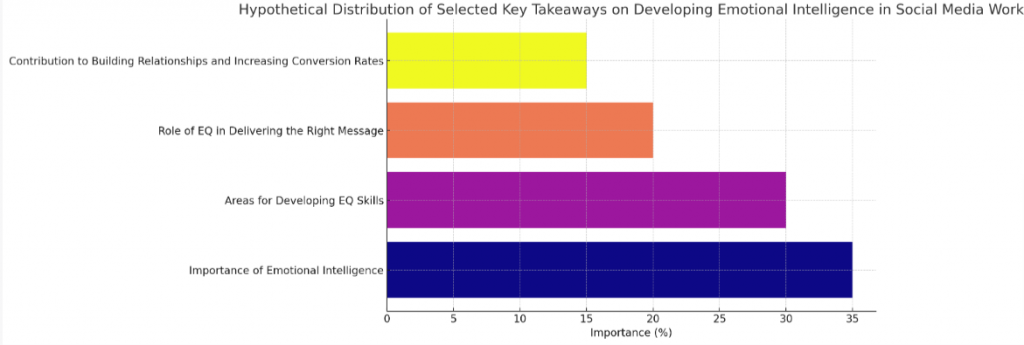Building Connections: Developing Emotional Intelligence in Social Media Work
Are you struggling to effectively connect with your audience on social media? Studies show that Emotional Intelligence (EQ) plays a critical role in successful social media interactions.
This blog post will guide you on how to develop and apply EQ to enhance engagement, build strong relationships, and increase conversion rates. Ready for the emotional journey of intelligence in the digital world?.
Key Takeaways
- Emotional intelligence plays a critical role in successful social media interactions, helping marketers deliver the right message at the right time and in the right way.
- Incorporating emotional intelligence into social media work is necessary for building strong relationships and increasing conversion rates.
- To develop emotional intelligence skills for effective social media work, individuals can focus on improving self-awareness, practicing self-regulation, building empathy, and enhancing social skills for communication and relationship-building.

The Importance of Emotional Intelligence in Social Media Work
Emotional intelligence plays a vital role in social media work. It’s the force that helps marketers deliver the right message, at the right time and in just the right way. With its focus on identifying and understanding emotions, emotional intelligence enables professionals to decode users’ sentiments effectively.
Social platforms are not just for communication but also act as listening tools. They provide invaluable customer feedback, revealing insights into user perceptions, preferences and pain points.
This knowledge is crucial for developing personalized content that resonates with users.
With advancements in technology such as marketing automation tools, businesses can track customer behavior more accurately. By understanding their audience’s emotions through these behavioral insights, they can tailor their social media strategies accordingly to create meaningful connections.
Incorporating emotional intelligence into your social media work isn’t an option—it’s a necessity. The future of digital marketing hinges largely on this ability to empathize with customers and respond genuinely while building trust where it counts most—heart-to-heart.
Understanding Emotional Intelligence
Emotional intelligence, often abbreviated as EQ, is an essential concept in understanding our own emotions and those of others. In the realm of social media marketing, it translates into the power to inspire action by delivering the right message at the exact moment needed.
A critical part of emotional intelligence is comprehending motivations behind consumer decisions — a factor deemed more vital than mere product features. Harnessing this form of intelligence enables marketers to leverage social media platforms effectively—not just for broadcasting messages, but also as unique channels for listening to customer feedback and addressing pressing concerns or complaints promptly.
With the help of advanced marketing automation tools available today, businesses can keep track of user behavior patterns and implement data-driven strategies that heighten personalization in their marketing—one key way emotional intelligence comes into play is here—creating appealing and relevant content tailored specifically towards target audiences.
Moreover, emotionally intelligent marketers understand well how storytelling can elicit deep connections with audiences; such narratives are powerful devices able to captivate attention and spark engagement when done right.
Incorporating Emotional Intelligence into Social Media Strategies
Leveraging emotional intelligence in social media strategies allows brands to connect with their audience on a deeper level, fostering genuine relationships and driving meaningful engagement.
Discover how to incorporate emotional intelligence into your social media approach for maximum impact.
Listening to the Audience
Engaging with your audience on social media is not just about posting content and waiting for likes – listening holds immense importance too. By carefully observing the reactions, comments, shares, and even direct messages from your followers, valuable insights can be gathered.
Buzzfeed CEO Jonah Peretti emphasizes that digital marketing is all about understanding human behavior and what compels them to share content. Intelligent marketers harness these user interactions to sharpen their consumer understanding and tailor personalized content.
Marketers also use modern tools like marketing automation tools to track consumers’ behaviors and preferences effectively. So get into the habit of paying attention to customer feedback; it’s a gold mine of information that can help you adjust your strategies in real-time for better social media engagement.
Empathizing with the Audience
Emotional intelligence plays a pivotal role in social media marketing, particularly when it comes to empathizing with the audience. This isn’t about guessing or making assumptions; empathy involves truly understanding consumers’ needs, wants, and pain points.
Successful marketers put themselves in the shoes of their consumers, sharing their feelings and creating content that resonates on an emotional level. According to studies, 63% of consumers feel misunderstood by their favorite brands.
Empathy can bridge this gap by providing insights into what customers really want and how they see your brand. From there, you can tailor your messaging to better connect with your audience’s emotions and experiences—fostering trust and building meaningful relationships that drive engagement and loyalty.
Providing Assistance to Customers
Brands understand the importance of providing assistance to customers on social media platforms. By being accessible and responsive, brands can create a positive brand image and build trust with their audience.
When customers reach out for help or have questions, it is crucial for brands to respond promptly and effectively. This not only addresses customer concerns but also shows that the brand values its customers’ needs.
Additionally, by incorporating emotional intelligence into these interactions, brands can deliver personalized support, making customers feel heard and valued. Through active listening and empathetic responses, brands can foster strong relationships with their customers and inspire loyalty.
Research has shown that when companies provide exceptional customer service on social media, it has a significant impact on consumer perception and purchase decisions. Customers appreciate when brands go above and beyond to assist them in resolving issues or finding solutions.
Brands should take advantage of marketing automation tools to streamline their customer assistance efforts while maintaining a personal touch. By analyzing customer feedback and addressing pain points proactively, brands can enhance the overall customer experience.
Taking inspiration from successful examples like British Airways’ #lookup ad campaign or Airbnb’s personalized content approach, brands can use storytelling techniques to engage emotionally with their audience while providing assistance.
These strategies tap into the power of emotion in marketing by establishing an emotional connection with customers through authentic experiences.
In conclusion, By prioritizing customer support on social media platforms and incorporating emotional intelligence into interactions, brands can strengthen relationships with their audience.
Through prompt responses, active listening, and empathetic communication, brands demonstrate care for their customers and create positive brand experiences.
Developing Emotional Intelligence Skills for Effective Social Media Work
To develop emotional intelligence skills for effective social media work, individuals can focus on improving self-awareness, practicing self-regulation, building empathy, and enhancing social skills for communication and relationship-building.
Improving Self-Awareness
Improving self-awareness is a crucial step in developing emotional intelligence skills for effective social media work. It involves recognizing and understanding one’s own emotions and their impact on others. By enhancing self-awareness, social media marketers can better understand how their actions and words may be perceived by their audience.
This awareness allows them to make conscious choices about their communication style, tone, and content, ensuring that they align with the desired brand image and resonate with the target audience. Developing self-awareness also helps marketers identify areas of improvement and growth, enabling them to constantly refine their strategies for better engagement and results.
- Reflecting on personal emotions
- Recognizing emotional triggers and patterns
- Examining the impact of emotions on decision – making
- Seeking feedback from colleagues and customers for self – assessment
- Practicing mindfulness to stay present in the moment
- Engaging in self – reflection exercises to gain deeper insight into personal strengths and weaknesses
- Journaling to document thoughts and feelings related to work experiences
- Taking personality assessments or working with a coach to gain a better understanding of individual tendencies
Practicing Self-Regulation
Practicing self-regulation is a key aspect of developing emotional intelligence in social media work. It involves having control over one’s emotions and reactions, which can lead to better decision-making and more effective communication. It also helps maintain professionalism and avoid unnecessary conflicts or misunderstandings. By practicing self-regulation, social media marketers can create a positive online presence and build trust with their audience.
- Recognizing and managing emotions in high – pressure situations
- Taking a step back before responding to negative comments or feedback
- Being aware of personal triggers and implementing strategies to stay calm
- Setting boundaries for personal and professional use of social media
- Taking breaks from social media to recharge and refocus
- Seeking feedback from peers or mentors to gain perspective on one’s actions
- Reflecting on past experiences and learning from mistakes
- Developing coping mechanisms for stress management
- Being open to constructive criticism and using it as an opportunity for growth
Building Empathy
Building empathy is a crucial component of developing emotional intelligence in social media work. It allows marketers to understand and connect with their audience on a deeper level. By putting themselves in the shoes of their customers, they can better address their needs and pain points. This can be achieved through:
- Actively listening to customer feedback and concerns.
- Paying attention to the emotions conveyed by the audience in their responses.
- Responding empathetically and providing personalized solutions.
- Creating content that resonates with the audience’s emotions.
- Showing genuine care and understanding in customer interactions.
Enhancing Social Skills for Communication and Relationship-Building
Improving social skills is crucial for effective communication and relationship-building in social media work. These skills can be developed by:
- Practicing active listening to understand the needs and preferences of the audience.
- Responding promptly and empathetically to customer queries and concerns.
- Engaging in meaningful conversations with followers to build trust and loyalty.
- Collaborating with influencers and industry experts to expand reach and credibility.
- Customizing communication styles based on the preferences of different audience segments.
- Adopting a friendly and approachable tone to foster positive interactions.
- Resolving conflicts or negative situations calmly and professionally.
- Adapting to evolving trends and technologies in digital communication.
Conclusion
Developing emotional intelligence is crucial in social media work for effective marketing and customer engagement. By incorporating strategies such as listening to the audience, empathizing with them, using storytelling techniques, and providing assistance when needed, brands can create meaningful connections with their customers.
Additionally, improving self-awareness, practicing self-regulation, building empathy, and enhancing social skills are essential for developing emotional intelligence skills that will lead to success in social media marketing.
Embracing emotional intelligence in this digital age can result in increased brand loyalty, advocacy, and ultimately drive business growth.

